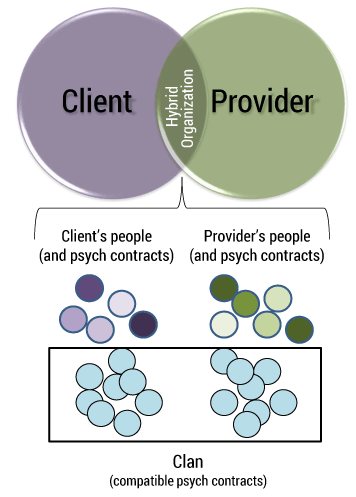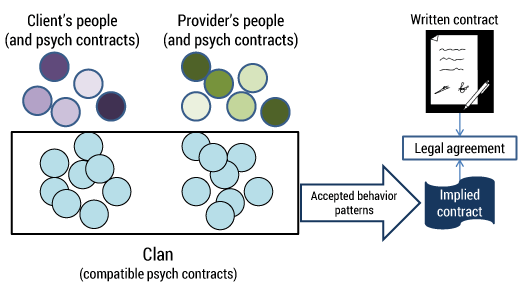BT & DTS VOL. 18, NO. 23

In the previous Executive Update, I introduced the concept of psychological contracts in outsourcing. A psychological contract is an individual’s assumptions and beliefs about what each party to a contract is to do and how they are to act. This includes that individual, the other people in his/her party, and all of the people in the other party.
The psychological contract is equally as important as the written contract because it gets acted out and acted upon. The written contract is often too long, too complex, and too user-unfriendly to be uniformly understood in the same way by everyone delivering or receiving the services. Additionally, in some cases, the written contract is only seen by a few select people. This can be because a party doesn’t want to risk the contract falling into the wrong hands, doesn’t believe folks can understand it, or wants to avoid confusing or worrying them.
Central to psychological contracts is the inherently perceptual nature of contracts and the need to manage relationships, not just compliance with the written contract. In this Update we’ll be exploring the legal aspects of these contracts. When individuals begin to act as collectives (or clans, as they are known) with shared values and behaviors, patterns of behavior can override what the written document might say — not just in practice, but legally as well.
Norming of Psychological Contracts
Psychological contracts start out as individually held beliefs and understandings. But as people begin to exchange opinions and expectations, clans begin to emerge. A clan is born when values become shared and understandings become consistent within a group (see Figure 1).

Non-clan individuals will still hold their own psychological contracts outside of the group, but the clan will start developing the biparty culture of the contract, otherwise known as the hybrid organization. The hybrid organization is an interlinked subset of the two parties to an outsourcing contract, reflecting the melding of those people within the client and the provider that interact frequently and have degrees of codependence.
A clan can be a force for good or evil. A group of procurement and contract managers in a telco that I worked with called themselves the “toe cutters.”1 They took great pleasure in getting penalties out of suppliers. One stated, “If we make penalties equal to our salaries, then we’re self-funding. But if we make penalties greater than our salaries, then we’re actually a profit center.” Every individual who joined the group was indoctrinated into this philosophy. Despite it being rather perverse — wanting failure and poor performance as contract outcomes — the group was able to thrive for a decade before eventually becoming unwound due to the damage that was inflicted on supplier relationships and the client’s brand in the supplier market. The written contracts stated the client may seek financial recourse for poor performance, and it had the KPIs and formulas to calculate such recourse; however, it was never the intention that it would become the driving imperative in its supplier relationships. It was the toe cutter clan that made it so.
Clan Patterns
The example given above illustrates a unilateral clan (it was in one party); more commonly, clans are formed between individuals across both parties. These clans more often show positive behaviors such as mutual flexibility rather than strict adherence to the contract, and joint problem solving rather than using the fault-oriented clauses in the contract.
These shared values become what drives and guides the clan members, eventually forming a shared psychological contract. If members are influential enough, and are consistent in carrying out the psychological contract with proven results, then it can become the “way we do things here” for both parties.
A clan’s collective psychological contract sets in place patterns of behavior that both parties accept, and can quickly become more important than the written agreement. Once these behaviors become “how we do things,” the parties rely on the psychological contract continuing in the future. It is at that point that it becomes part of the legal agreement.
Effect on the Legal Agreement
There are a three main ways in which the psychological contract can affect a court’s interpretation of the written contract — these are estoppel, the course of performance, and the course of dealing. The courts are all over the place on the application of these concepts, as will be the advice from your legal representatives. In this Update, however, we attempt to show a prevailing view that’s worth noting, especially if the written contract and the psychological ones vary.
The first concept is that of estoppel. Estoppel is a form of obligation that operates alongside, and is often pleaded as an alternative to, a contract. It is a French term meaning “to stop or plug.” Estoppel prevents a party from asserting a fact or a claim inconsistent with a position that the party previously took, either by conduct or words. Estoppel is the law’s way of saying, “you can’t have your cake and eat it too.”
For example, if the provider was to deliver goods to a specific location in the contract but the buyer accepts delivery at the new location, the buyer would be estopped from later claiming a breach or nonconformance. Contract terms can be rendered unenforceable via estoppel even if there is a clause stating that the agreement can be varied only with the written agreement of parties. Contracts cannot exempt themselves from law.
There are also legal doctrines that work with estoppel to alter the terms and conditions because of behavior patterns. The course of performance refers to a pattern of behavior that occurs after a contract has been signed and acts as a variation by conduct (rather than a written or verbal variation). The course of performance applies only when a contract requires a repetitive series of performances. There must be more than one performance, but no particular number is required.
A clan acting on their collective psychological contracts can bring the course of performance into play through their behavior patterns. If the clan believes, for example, that flexibility should be shown as opposed to strict adherence to a contract, and then demonstrates through their behavior that flexibility is the dominant construct, it becomes an accepted course of performance.
Many times, the acts of the parties will be inconsistent with the pertinent contractual language. This is often necessary, as the people who wrote the contract cannot envision every twist and turn needed to make outsourcing work in practice. A party may try to argue that the explicit terms of the contract should prevail over the course of performance. But the predominant view is that no contractual term is so clearly defined that a party cannot demonstrate what is intended by the way in which the parties actually carried it out. Actions will speak louder than words.
If a dispute later arises regarding the performance of a contract obligation (say, to provide certain services in a certain way), and there was no previous objection to delivering something different, the course of performance can stand against the explicit terms. The courts will look to the course of performance to determine how the parties intended the obligation to be completed. If flexibility became the accepted norm and, as a result, the services transformed into something different than what the original contract envisioned without objection by a party, then these are the services that are to be performed. One need not expressly agree to how the performance was carried out; the lack of an objection is sufficient.
Finally, there is another related legal concept: the course of dealing. The course of dealing is very similar to the course of performance, but it refers to a clearly recognizable pattern of previous behavior between the parties (that is, before the signing of the current contract). If you have more than one contract with a provider, are extending an existing contract, or signing a new one with a provider that you’ve used before, then the past conduct can be used to interpret current dealings and future expectations. The idea is that the parties drew up the contract in view of the customary manner in which they had previously transacted business together. The course of dealing established a common basis of understanding for interpreting their contract and expected conduct. As a result, previous psychological contracts that have been put into practice affect the interpretation of future written contracts. So if the parties had previously, for example, ignored penalty clauses as adversarial and against the spirit of the undertaking, then it would be reasonable to assume this will continue. A party can rely on this past behavior continuing unless the other party states otherwise (and acts on it).
Conclusion
An outsourcing relationship is fluid, not stagnant. It is natural for that relationship to grow and change during the term of the agreement. It is also natural for the parties to want to relax contractual requirements when circumstances call for it or better outcomes can be achieved.
All of the legal avenues act in concert to give psychological contracts that result in patterns of behavior; the status of an implied contract that sits alongside the written one. The original written contract hasn’t been touched, but it is now augmented, informed, and sometimes replaced by an established normative psychological contract. Figure 2 sums up the legal effect.

Once psychological contract behaviors have set in, these can overshadow the written contract. On occasion this can be bad. For example, a client team with insufficient resources to ensure contract compliance just won’t be able to. Suppliers can quickly figure this out and relax, knowing that the client isn’t keeping watch. Over time, the client can be prevented from going back to the contract, even if one day it sufficiently resources itself to manage contracts. The supplier has many legal avenues available to it because it was the client who chose the course of inaction to the extent that it became a norm.
On the other hand, and much more important from a commercial rather than legal perspective, is that creating and fostering constructive psychological contracts can have great benefits in setting the culture and locking in positive strong behaviors as the norm. This will be the topic of our last Executive Update on psychological contracts — harnessing the value.
1 A toe cutter is slang for a person who extorts money. As the name implies, this involves painful removal of the digits of one’s foot.



